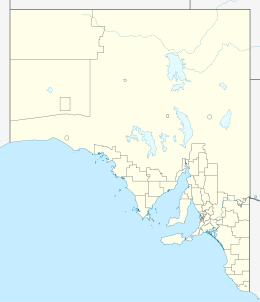Armagh, South Australia
| Armagh South Australia | |||||||||||||
|---|---|---|---|---|---|---|---|---|---|---|---|---|---|
|
The old disused kiln and chimney | |||||||||||||
 Armagh Location in South Australia | |||||||||||||
| Coordinates | 33°50′S 138°35′E / 33.833°S 138.583°ECoordinates: 33°50′S 138°35′E / 33.833°S 138.583°E | ||||||||||||
| Population | 257 (2006 census)[1] around Emu Flat area (2006 Census) | ||||||||||||
| Established | 1850 | ||||||||||||
| Postcode(s) | 5453 | ||||||||||||
| Location | |||||||||||||
| LGA(s) | District Council of Clare and Gilbert Valleys | ||||||||||||
| Region | Mid North | ||||||||||||
| State electorate(s) | Frome | ||||||||||||
| Federal Division(s) | Wakefield | ||||||||||||
| |||||||||||||
Armagh is a small historic village in the western Clare Valley, about 137 km north of Adelaide, South Australia.
History
The village was named after the town and county of Armagh in Ireland. It was founded in 1850 to benefit from the new copper mine, operated by the Royal Mining Company at nearby Emu Flat. The mine was built as part of a mania for copper mining prompted by the large copper finds at Burra and Kapunda but, though some mining efforts continued until 1910, was never successful commercially.[2]
The town today
Today the hills around Armagh are known for the production of wine and olive oil. Most of the old town has vanished leaving only a brick kiln, claypit, a few houses and the Miner’s Home Hotel, now a private museum.
References
- ↑ Australian Bureau of Statistics (25 October 2007). "Emu Flat (State Suburb)". 2006 Census QuickStats. Retrieved 2008-05-17.
- ↑ Noye, Robert J. (1980). CLARE – A District History. Hawthorndene, South Australia: Investigator Press. pp. 118–123.
External links
This article is issued from Wikipedia - version of the 10/26/2016. The text is available under the Creative Commons Attribution/Share Alike but additional terms may apply for the media files.